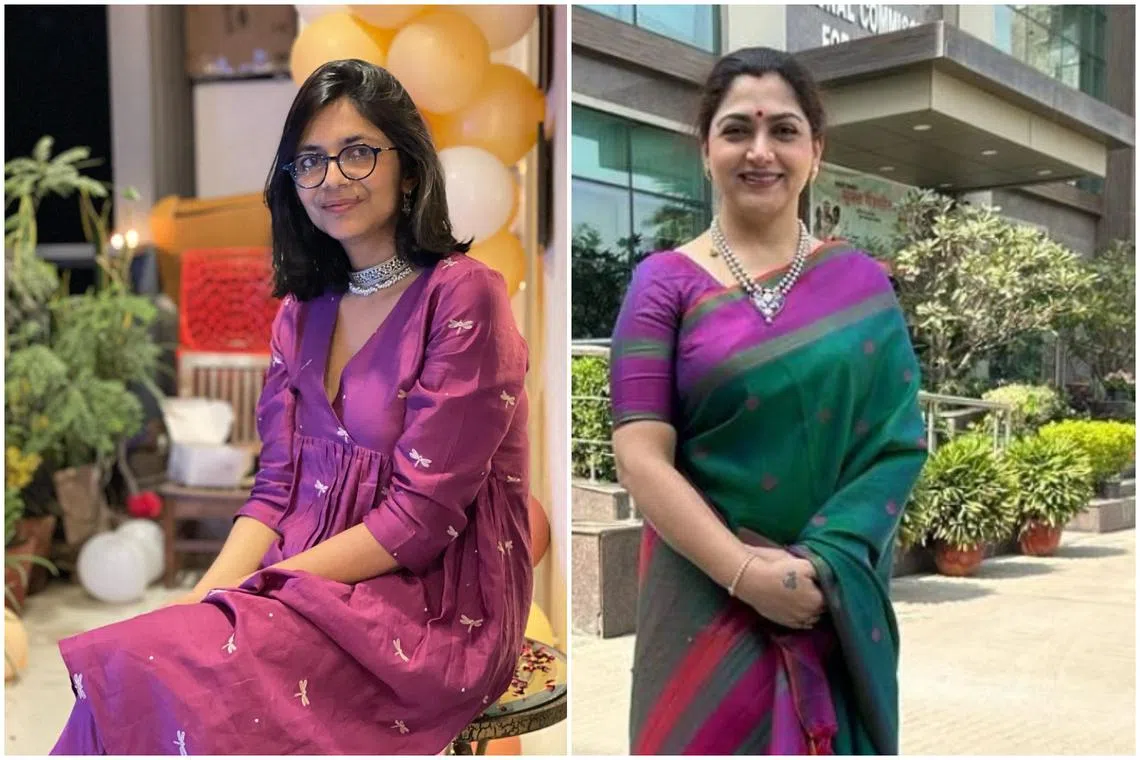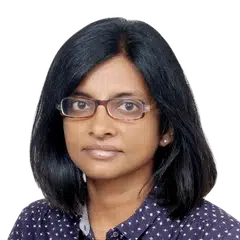Prominent women in India speak out against sexual harassment within family
Sign up now: Get insights on Asia's fast-moving developments

Delhi Commission for Women chair Swati Maliwal (left) and actor-turned-politician Khushbu Sundar both publicly revealed they had been sexually assaulted by their fathers.
PHOTOS: SWATI JAI HIND/FACEBOOK, @KHUSHSUNDAR/INSTAGRAM
Follow topic:
NEW DELHI - In India, it is unusual for public personalities to come out about rape or other forms of sexual harassment at the hands of a family member.
So when popular actor-turned-politician Khushbu Sundar revealed that she had been sexually abused by her father from the age of eight, it further opened up the conversation around rape and incest in the South Asian country.
“A man who probably thought it was his birthright to beat up his wife, beat up his children, sexually abuse his only daughter... When my abuse started, I was just eight years old, and I had the courage to speak out against him when I was 15,” she told Mojo Story, an online news website, on March 6.
Ms Sundar, who has two daughters, has been newly appointed to the National Commission for Women, which advises the government on policy.
She entered politics in 2010 and has since returned to do films and TV serials.
At the height of her acting career in 2001, fans even built a temple in her honour in Thiruchirapalli, in the state of Tamil Nadu. However, it was demolished by protesters in 2006 when she spoke out about premarital sex and the importance of girls protecting themselves during sex, angering conservative elements in society.
Ms Sundar said her father died in Mumbai in 2022.
Her revelations about her sexual abuse at his hands, shared at an event with school and university students, created ripples in a country where many rape and sexual harassment cases go unreported due to societal stigma or fear of retribution.
Following this, another prominent public figure, Ms Swati Maliwal, who chairs the Delhi Commission for Women, also disclosed her experience of abuse.
“I was sexually assaulted by my father when I was a child. He used to beat me up, and I used to hide under the bed,” she told reporters.
Sexual crimes against women and children remain a concern in India amid an effort to provide a safe environment for women and girls.
Official data recorded 3,038 girls and 28,840 women raped in 2021, up from 2,655 girls and 24,225 women the year before. Of these rape victims in 2021, 96.5 per cent knew the rapist beforehand, and 2,424 of these crimes were committed by family members.
But activists believe this is just the tip of the iceberg.
The 2019-2021 National Family Health Survey, which interviewed 724,115 women from across India, found that 90 per cent of women did not report sexual violence against them.
The disclosures of the two women bucking the norm and having the courage to speak about familial sexual abuse when they were children were impactful, said child and women rights activists.
“This involves the father, someone a child looks up to. This is the last frontier as far as this issue goes, not just in India, but outside, in the world. When you have two high-profile women sharing two incidents of this nature, it creates waves,” said Mr Ashwini Ailawadi, co-founder and creative director of the Rahi Foundation, which helps women survivors of incest and child sexual abuse.
“The ripples are going to be long-lasting, even if the news cycle is short. There will be some invisible incest survivor who will take hope.”
Dr Shruti Kapoor, founder and president of the Sayfty Trust, a non-profit empowering women against violence, said: “Any survivor sharing their personal experience with sexual abuse is commendable and courageous. This might give others the courage to share their own personal experiences if they are ready, or seek help for their own healing.”
India, like many other countries, saw the #MeToo movement initiate discussions
But across India, victims and their families are often hesitant to approach the police and courts for fear of reprisal and the stigma.
They also struggle to get justice, as court cases can take years and conviction rates are low.
In a sign of how victims face blowback, some social media users dug up an old tweet of Ms Maliwal describing herself as a proud daughter.
In response to the trolling, Dr Nayreen Daruwalla of the Society for Nutrition Education and Health Action said: “Women from the middle and upper classes find it very difficult to talk about and disclose abuse. I understand why – they have too much at stake.”
Previously, a woman who was raped would not go into the police station because of public shaming, but now survivors face the same torment from Internet users, added the programme director for the prevention of violence against women and children at the non-profit organisation in Mumbai.
Four incest survivors are drafting a letter of support to Ms Maliwal expressing solidarity with her, said Ms Anuja Gupta, founder and executive director of Rahi Foundation.
Ms Gupta said the implementation of the laws remains patchy but noted: “Justice doesn’t always mean going to court for (incest) survivors. For many survivors, it means an apology, and acknowledgement of the abuse and the harm it caused to them .”


